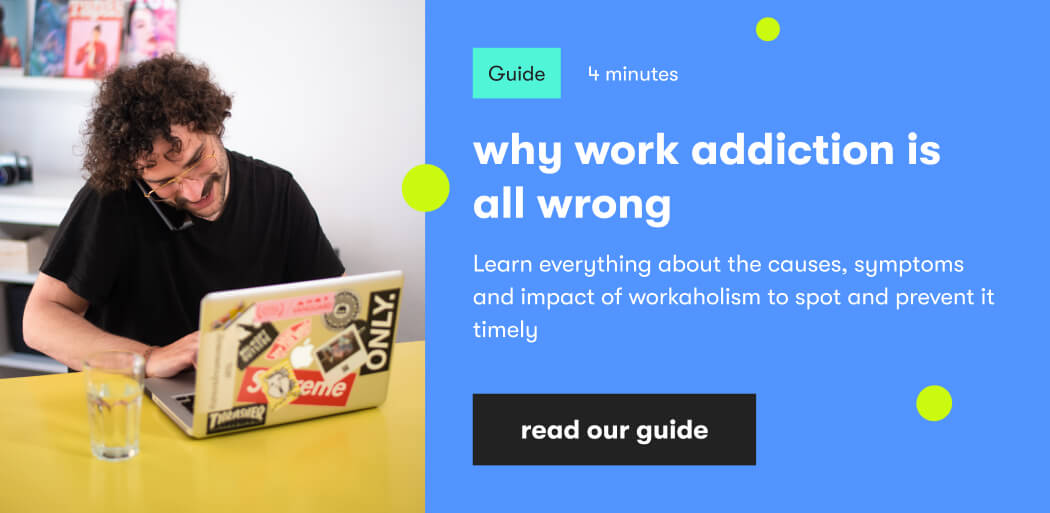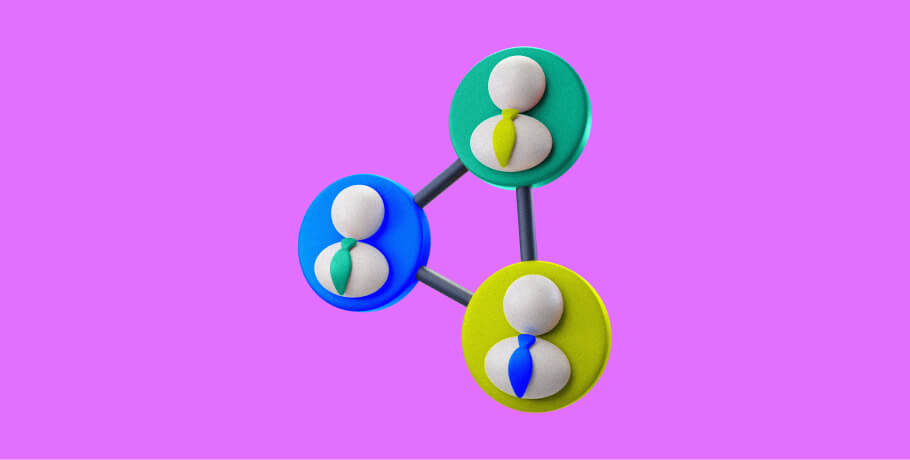How to stop being a workaholic and think not only about work. Workaholism has become a 21st-century addiction that expanded its reach even further, as many of us embrace the questionable trend of working more and more hours each day.
Here's your quick test for symptoms of workaholism:
- Do you constantly work longer hours than are expected or required?
- Do you cram work obligations into every moment of your schedule?
- Are you accessible nearly 24/7, dealing with endless emails and messages?
- Do you tend to ignore health issues, “pushing through” them to meet work deadlines?
- Are you using work to avoid unpleasant relationship issues?
- Do you sacrifice spending time on activities you (used to) enjoy and work instead?
If you answer yes to more than half of these questions, we have some unfortunate news for you: symptoms of workaholism may be sneaking up on you.
On the bright side, workaholism treatments exist. Keep reading to find out how to stop being a workaholic and how to stop thinking ONLY about work.
But first...
Why it’s important to recognize the issue and find workaholism treatment
To figure out how to stop being a workaholic, it's essential to understand what's triggering it. Like any other addiction, workaholism is the way a person responds to specific circumstances. If the underlying issues remain unresolved, workaholism treatment and true relief will likely remain elusive.
Causes of workaholism might include efforts to escape from a traumatic experience, relationship issues, or life more generally. Today, for many of us, work is an integral part of our identity, making it even more challenging to disconnect and find out how to stop thinking about work exclusively.
It is important to recognize that ignoring the signs of workaholism can lead to serious issues in:
- Mental health. Being a workaholic negatively affects your mental and emotional health and may lead to irritability, depression, anxiety, and other troubling consequences.
- Physical health. Maintaining a frenzied working pace and load can have physical consequences as well, ultimately causing damage to your lungs, heart, and entire immune system, adding to the vicious cycle of never-ending stress.
- Personal life. Constantly being at work or in “work mode” and neglecting people around you leads to social isolation and can result in you losing friends and loved ones.
Good news, there's a way out: check out six strategies of how to cure a workaholic.
How to deal with a workaholism: Six ways to address the problem
1. Identify the underlying problem
This can be the most challenging but vital aspect of work addiction treatment. Be honest with yourself, so you can identify and analyze motivators for your behavior. It might be anxiety, avoidance, fear of rejection, need for approval, or other personal reasons. Uncovering what's behind your workaholism can be uncomfortable, but once you face it, you'll be able to take the next step toward a cure.
2. Adhere to established working hours
Once you start your work addiction treatment, you’ll need to think about how to deal with a workaholism in terms of your work. Establish a clear work schedule and stick to it. It may be hard, but keep trying. Focus on your work tasks and communication with colleagues only during your work hours. Once your workday officially ends, turn off your messengers and all work-related notifications.
To ease the stress that may be associated with limiting your work hours, remember that you can be very productive in relatively short blocks of time. Plan your work time strategically so that you can enjoy the satisfaction of accomplished tasks, maintain your work quality, and switch between different assignments. Think about working smarter rather than harder.
3. Set perfectionism aside
In software product development, you learn early on: "better done than perfect." Another option for how to deal with workaholism is to determine when perfection is truly necessary. Incorporate the habit of evaluating your tasks to see if there's a chance to iterate while working on them. This way, you won't need to complete each task perfectly in one sitting, giving you a chance to best allocate your resources and time.
4. Include breaks in your calendar
Literally. Breaks shouldn’t just be aspirational, they should appear in your calendar. Schedule a lunch, a workout, or a 15 min walk to grab a coffee and clear up your head. These whitespaces between tasks are essential. Not only will they help you take a rest, they’ll also increase your creativity and your productivity. Include this tip on your "how to stop being a workaholic" to-do list.
5. Take a vacation
It seems obvious, but this work addiction treatment is often neglected. Any consideration of how to deal with a workaholism should include a discussion of time away from the office One goal should be to take your vacation at least once a quarter and plan activities which will help you unplug from your work completely. Hiking, a boat trip, cycling, or a road trip across the country will help you forget about your laptop and email box for a week or so.
Also, it's a good practice to take an extra day off once each month, just to get some rest, take care of your health, or do some housekeeping. The important thing is not to try to catch up on work during this day.
6. Add activities that help you recover
One more suggestion about how to cure workaholism is to resume doing things that you enjoy (or used to enjoy), and which help renew your energy. These can be simple things like taking a hot bath, reading a book, taking a walk without any devices, stretching, breathing exercises, or a short call to a friend. All of these are good steps to take to start moving towards relaxation. To ease your way in, start adding activities that take just a few minutes. Then begin stretching the time until it is long enough to schedule a workout, breakfast with a friend, or a whole evening in which you focus on your hobby.
How to stop thinking about work: final thoughts
We hope these tips offer you useful options for how to cure the workaholic in yourself. Don't just ignore workaholic tendencies since doing so may lead to chronic stress, exhaustion, and complete burnout.
Instead, start with small steps towards bringing some rest and relaxation into your life. Give yourself time, and permission, to cope with the problem, do things that make you happier, and remember that you need to replenish your resources regularly. This transformation won’t happen overnight, but it will happen. And it’ll be great.

Explore our Editorial Policy to learn more about our standards for content creation.
read more







.jpg)










